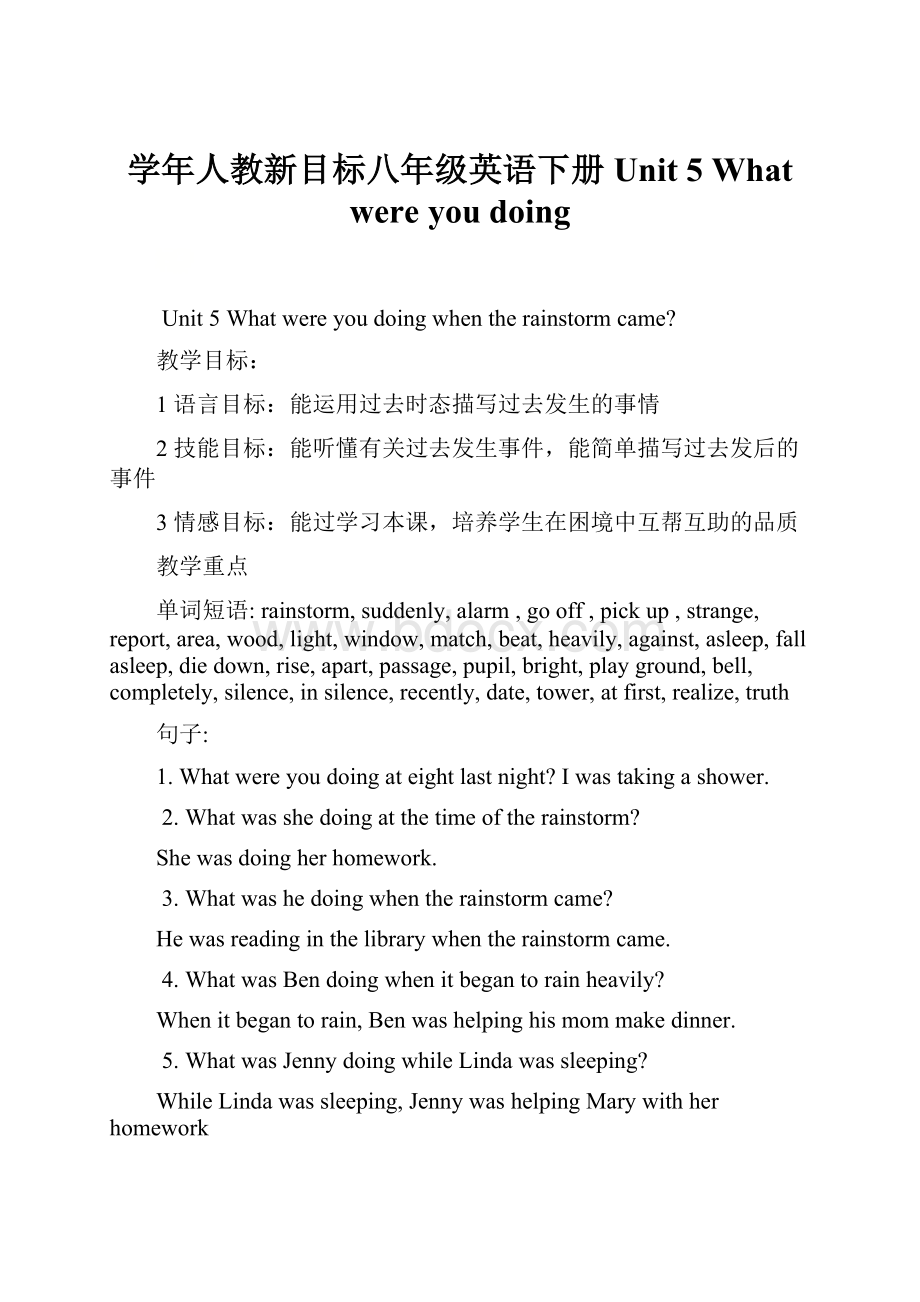学年人教新目标八年级英语下册Unit 5 What were you doing.docx
《学年人教新目标八年级英语下册Unit 5 What were you doing.docx》由会员分享,可在线阅读,更多相关《学年人教新目标八年级英语下册Unit 5 What were you doing.docx(36页珍藏版)》请在冰豆网上搜索。

学年人教新目标八年级英语下册Unit5Whatwereyoudoing
Unit5Whatwereyoudoingwhentherainstormcame?
教学目标:
1语言目标:
能运用过去时态描写过去发生的事情
2技能目标:
能听懂有关过去发生事件,能简单描写过去发后的事件
3情感目标:
能过学习本课,培养学生在困境中互帮互助的品质
教学重点
单词短语:
rainstorm,suddenly,alarm,gooff,pickup,strange,report,area,wood,light,window,match,beat,heavily,against,asleep,fallasleep,diedown,rise,apart,passage,pupil,bright,playground,bell,completely,silence,insilence,recently,date,tower,atfirst,realize,truth
句子:
1.Whatwereyoudoingateightlastnight?
Iwastakingashower.
2.Whatwasshedoingatthetimeoftherainstorm?
Shewasdoingherhomework.
3.Whatwashedoingwhentherainstormcame?
Hewasreadinginthelibrarywhentherainstormcame.
4.WhatwasBendoingwhenitbegantorainheavily?
Whenitbegantorain,Benwashelpinghismommakedinner.
5.WhatwasJennydoingwhileLindawassleeping?
WhileLindawassleeping,JennywashelpingMarywithherhomework
语法:
过去进行时。
教学难点:
when,while引导的时间状语从句中的过去时和过去进行时
课时划分
SectionA1(1a-2d)
SectionA2(3a-3c)
SectionA3(Grammarfocus-4c)
SectionB1(1a-2e)
SectionB2(3a-Selfcheck)
SectionA1(1a-2d)
Step1Warmingup
Yesterday,therewasarainstorm.Whereweretheywhentherainstormcame?
Herearesomereports.
Forexample:
A:
Wherewereyouwhentherainstormcame?
B:
Iwasinthelibrary.
A:
Whatwereyoudoingwhentherainstormcame?
B:
Iwaswaitingforthebusatthebusstop.
Workon1a.Wherewerethepeopleatthetimeoftherainstorm?
Matchthe
statementswiththepeopleinthepicture.
1._____Iwasinthelibrary.
2._____Iwasinmyhouse.
3._____Iwasonthestreet.
4._____Iwasatthebusstop.
Step2Speaking
Lookatthepicturesandanswerthequestionsbyusing“was/were+doing”
Forexample:
A:
Whatwasyoursister/brotherdoingatthetimeoftherainstorm?
B:
He_____________________.
Step3Listening
Whatweretheydoingwhentherainstormcame?
Let’slisten.Payattentionto
“was/were+doing”
1bListentotheTVreportandcirclethecorrectresponse.
a.doingmyhomework/studying
b.playingbasketball/reading
c.goingtowork/waitingforthebus
d.walkinghome/shopping
Listenagainandanswerthequestions.
1)What’stheweatherliketoday?
2)Howwastheweatheryesterday?
3)Howwastherainstormyesterday?
4)Whyistheboygladhedidn’tdecidetoplaybasketball?
5)Whydidthemanstillgetwetwhenhehadanumbrella?
Pairwork:
1cTalkaboutwhatthepeoplein1aweredoingatthetimeoftherainstorm.
Step4Listening
2aListenandnumberthepictures1-5.
2bListenagain.Fillintheblanksinthesentencesin2a.
Myalarmdidn’tgooffsoI______uplate.
I_____tothebusstopbutIstillmissedthebus.
I____________forthebuswhenitbegantorainheavily.
I____sobusy_______fortheumbrellathatIdidn’tseeacarcoming.
Itookahotshowerand____somewarmfood.
Listenagain.Lookatthestatementsbelow.Aretheytrueorfalse?
1)Theyboydidn’twakeupuntilseventhirtybecausehisalarmdidn’twork.
2)Hearrivedatschoolateight.
3)Hestilldidn’tcatchthebusalthoughherrantothebusstop.
4)Whilehewaswaitingforthebus,itsuddenlystartedtorainheavily.
5)Whilehewasbusylookingfortheumbrellainhisschoolbag,acarcameandgotwateralloverhim.
Step5Speaking
2cUsetheinformationin2atoretellthestoryinaconversationbetweentheboyand
aTVreporter.
2dReadtheconversationandfillintheblanks.
7:
00pm
8:
00pm
9:
00pm
WhatwasLindadoing?
Wherewasshe?
Role-playtheconversation.
Step6Languagepoints
1.Myalarmdidn’tgooffsoIwokeuplate.
alarmn.闹钟
e.g.WhattimeshallIsetthealarmfor?
我该把闹钟拨到几点钟响?
2.Iwaswaitingforthebuswhenitbegantorainheavily.
1)beginv.(began)开始
e.g.Thebellringsandtheclass begins.
铃响了,开始上课。
2)heavilyadv.在很大程度上;大量地
e.g.movingheavily吃力地移动
Itwasrainingheavily.雨下得很大。
3.So,whentherainstormsuddenlycame,…
suddenlyadv.突然;忽然
e.g.IsuddenlyrememberedthatIhadn’tlockedthedoor.
我忽然想起没有锁门。
4.That’sstrange.
strangeadj.奇特的,奇怪的;不可思议的
e.g.astrangenoise奇怪的声音
Theroomwasstrange.这个房间很奇怪。
5.Icalledatsevenandyoudidn’tpickup.
pickup(=pickupthephone)接电话
pickup还有以下含义:
1)拾起;抱起
e.g.The children picked up many sea shells at the seashore.
孩子们在海边捡到许多贝壳。
Pick that book up.
把那本书捡起来。
2)(开车)接人;搭载
e.g.I’llpickyouupatyourhometomorrow.
明天我会开车到你家接你。
【中考链接】
—Look!
What’sontheground?
—Oh,it’smysweater.Please________forme. (2016 黑龙江龙东地区)
A.pickupit B.pickitup C.pickitout
Step7Speaking
Makeasurvey.Askyourpartnersinyourgroupwhattheyweredoingatthefollowingtime.Fillintheformthengiveareport.
Time
Names
doing
Yesterday7:
00
Tom
reading
Peter
shopping
Yesterday8:
00
Tom
walking
Peter
…
Yesterday9:
00
…
…
A:
Whatwereyoudoingyesterdayat7:
00?
B:
Iwasreading.
Step8Summary
domyhomework 做我的作业
playbasketball 打篮球
gotowork 去工作
waitforthebus 等公共汽车
walkhome 步行回家
blackclouds 乌云
gooff (闹钟)发出响声
wakeup 醒来
takeahotshower 洗热水澡
pickup(=pickupthephone) 接电话
1.Whatwasthegirl/boydoingatthetimeof…?
She/Hewas…
2.Whatwereyoudoingwhentherainstormcame?
Iwas…
Step9Exercise
Ⅰ.根据句意,从方框中选择恰当的单词填空,有的需要变换形式。
alarm,begin,heavy,suddenly,strange
1.Idon’tknowwhyLily_________shoutedatme.
2.That’s_________—I’msureIputmyglassesinmybagbutthey’renotthere.
3.Alan’sschool_________at8:
00a.m.andfinishesat3:
00p.m.
4.Mymomaskedmetoset(设置)the_________for7o’clock.
5.Youcan’tgoouttoplayfootballbecauseitisraining_________outside.
Ⅱ.根据汉语意思完成英语句子,每空一词。
1.10分钟前我给妈妈打过电话,但是她没接。
Tenminutesago,IcalledMombutshedidn’t_________.
2.比尔,刚才你的闹钟响了。
Bill,justnowyouralarm_________.
3.今天早上我姐姐误公交车了。
Mysister_______________thismorning.
4.他想洗个热水澡。
Hewantsto_________________.
5.你能告诉我今天下午发生什么了吗?
Canyoutellme______________thisafternoon?
Ⅲ.根据对话内容,从方框中选择恰当的选项补全对话。
A.WhataboutyouryoungerbrotherJim?
B.Doesitworknow?
C.Whatwereyoudoingatthetimeoftheheavyrain?
D.Whydon’tyoubringittomyhome?
E.Whatwaswrongwithhisflashlight?
A:
Hey,Jenny.
(1)________
B:
Iwasdoingmyhomework.
A:
(2)________
B:
Hewasrepairinghisflashlight.
A:
Oh?
(3)________
B:
Itdidn’twork.
A:
(4)________
B:
No,itdoesn’t.Jimhasn’tfoundoutwhyitdoesn’twork.
A:
(5)________Myfatherisgoodatrepairingit.
B:
Thatsoundsgreat!
Thankyou.
A:
You’rewelcome.
Step10Homework
Writeashortpassage.Yourpassageshouldincludethefollowinginformation.
1)Whatwereyoudoingat8:
00yesterdayevening?
2)Wherewereyou?
3)Whowereyouwith?
SectionA2(3a-3c)
Step1Revision
Askyourpartnerwhathe/shewasdoinglastnight,thengiveareport.
Step2Freetalk
Rainstormiscoming…
Preparation…
Aftertherainstorm…
Step3Reading
1.Fastreading
Readthepassagequicklyandanswerthequestions.
1)Werewindsstrongorweak?
2)Werecloudsblackorwhite?
3)Wastheskydarkorbright?
4)Didneighborsstayinsideorcleanupoutside.
5)Howwastheneighborhoodafterthestorm?
6)Howwerethewindows?
Weretheygoodorbroken?
7)Wherewastherubbish?
Match the main idea with eachparagraph.
Para.1Theactivitiesduring(在……期间)therainstorm.
Para.2Theresult(结果)aftertherainstorm.
Para.3Theweatherbeforetherainstorm.
Para.4Thepreparation(准备)beforetherainstorm.
2.Workon3a.Readthepassageandanswerthefollowingquestions
1)Whatwastheweatherlikebeforetheheavyranstarted?
2)Whatwastheneighborhoodlikeafterthestorm?
Keys:
1.Blackcloudsweremakingtheskyverydark.Withnolightoutside,itfeltlikemidnight.
2.Theneighborhoodwasinamess.
3.Workon3b.Readthepassageagainandcompletethesentencesusinginformation
fromthepassage.
1)WhenthenewsonTVwasreported,strongwindswere_____________outside.
2)WhileBen’smomwasmakingsuretheradiowasworking,hisdad
________________.
3)Ben_____________________whentheheavyrainfinallystarted.
4)WhenBen_______________at3:
00a.m.,thewind_________________.
Keys:
1)wereblowing
2)wasputtingpiecesofwoodoverthewindows
3)washelpinghismommakedinner
4)fellasleep:
wasdyingdown
Step4Speaking
Workon3c.Discussthequestionswithapartner.
“Althoughthestormbrokemanythingsapart,itbroughtfamiliesandneighbors
closertogether.”Whatothercanbringpeopleclosertogether?
Howcanwehelp
eachotherintimesofdifficulty?
Step5Languagepoints
1.Withnolightoutside,itfeltlikemidnight.
此句中介词with表示一种伴随状况,同时还包含着某种因果关系,表示“因某
种状况的存在而导致……”,因此可翻译成“由于;因为”等。
e.g.Withmyparentsaway,I’mthekingofthehouse.
我爸妈不在家,我可是家中的“王”了!
Ican’tworkwithallthatnoisegoingon.
由于那噪音响着,我无法工作。
2.Ben’sdad…whilehismomwasmakingsuretheflashlightsandradiowere
working.
1)此句中的连词while的意思是“当……的时候;和……同时”,while还可以表示“而;然而;但”之意,用来说明和强调两种事情或情形不同。
e.g.TomisactiveandoutgoingwhilehissisterRosaisshyandquiet.
汤姆活跃外向,而他的妹妹罗莎却害羞腼腆。
2)makesure“确认,查明,核实;确保;设法保证”,其后可接句子,或接介词
of及宾语,用来引入需要确认的内容。
e.g.Couldyoumakesurewhattimehe’sarriving?
你能确认一下他几点到达吗?
MakesureyouturnofftheTVbeforeyouleavethehouse.
在你离开屋子前确认关了电视。
3)此句中的work表示机器,器官等“运作,运转”,这是动词work的一种基
本用法。
e.g.Theradiodoesn’twork.收音机坏了。
3.Benwashelpinghismommakedinnerwhentherainbegantobeatheavilyagainst
thewindow.
◆beat作动词,可意为“敲打;锤砸”。
如: